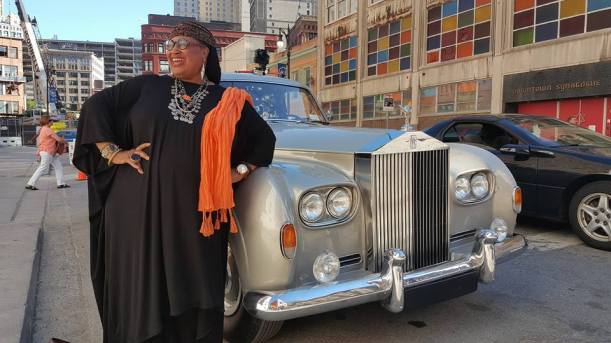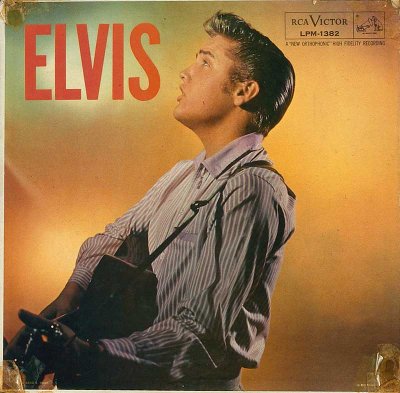I was besotted by such beauty in a man. The errant forehead curl, the pull of his lip that made the tiny sneer; imperfections that rendered him more beautiful. The sun was golden and Elvis was too. Yes, he was tawny then from a life in the Delta sun; his hair a slick, golden crown. This was years before his hair was dyed black for photos and film, and later, to hide the signs of time. Oh yes, back then, as I gazed at the album cover in my living room, he was a golden boy. He is Elvis, the light shines on him, and it shines on me.
There is a familiarity about him, a softness of speech and manner that is not unlike my own Southern father and uncles. There is none of the frantic crispness, the stiff, staccato notes of the North. No, his way is soft; he moves more like folks move in my world. I am 5 years old, yet I know this. There is too, an oddness about him, something untold. I learned later of a twin who died still born, and oh, the mystery of that child unknown. Another Elvis in the world was too much to contemplate. Maybe the spirit of the long gone child made Elvis become more than if they had both survived. His too lush beauty hints, to me, of long-lost secret ways, his eyes too heavy, lips too full, the nostrils spatulate. I wonder just what other blood flowed in those Delta veins, what long ago dark ancestor through him sweetly sang.
My daddy was a record shop man. Produced, wrote, recorded, pressed, published, and sold records. Growing up, I was surrounded by records, and as a child, I read album covers and liner notes – my earliest history class of the world and the people in it. Our house was full of records, 45′s, 78′s and the new “LPs”. Records were recorded even in our living room, the high, oak-beamed ceilings made for great acoustics. There were records all around – Stan Kenton and Oklahoma! and Bobby “Blue” Bland and Jerry Lee Lewis and Louis Jordan and Dinah Washington and Chuck Berry and Carl Perkins and Howlin’ Wolf and Peter and the Wolf and Mahalia Jackson and Tennessee Ernie and Ike and Tina and…., well, a whole lot of albums were in our lives. But the Elvis album cover I will never forget.
Years later it would be said that Elvis was a thief, a robber, a usurper of the music of others. But I think not. The men I knew, Black blues-loving Detroit men who lived in the North and hungered for their South, looked at him with the bemusement of affectionate elders, as if one of their own had played a trick on old Jim Crow. “Listen to that boy” they’d say, and shake their heads, “just look at him”. He was as familiar to them as sugar cane and red dirt. They knew just where he came from, just what kind of church he must have sat in as a child, by the way he played a chord, or sang a note.
They knew he’d seen that Holy Ghost grab someone and make them whoop and holler, in the churches of mothers’ boards and deacons, the churches of the gospel shout and stomp. Wasn’t his fault that there were those who made money off of the music of others, that society let him bust through musical doors that barred his darker brothers. He let rhythm music come through him, past the restraints of upbringing and environs. He didn’t turn our music white, but worked it through the channel of his own Delta life. Though how tortured was his wrestle with the secular and divine; oh, how tragic was his price.
I miss Elvis, even the jump-suited Las Vegas Elvis, the latter-day bloated and drug addled Elvis – yes, the eternally impersonated Elvis. But most of all, I miss the Elvis on that old album cover – the striped-shirted, tawny-haired, golden boy Elvis; with a profile as chiseled as Michelangelo’s David, his face as angelic as Gabriel, eyes raised towards Heaven. He’s the Elvis in my living room, with the sun shining on him, and shining on me.

